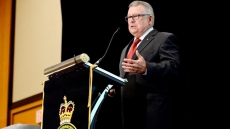OTTAWA — Mauril Belanger, a Liberal member of Parliament for more than two decades and a lifelong advocate for francophone rights in English Canada, has died after a very public battle with an incurable neurodegenerative disease.
Prime Minister Justin Trudeau used Twitter to announce Belanger's death on Tuesday night.
"Mauril Belanger has passed away. He was a great friend, tireless MP and brave fighter," Trudeau tweeted. "The entire Parliamentary family mourns his loss."
Belanger, 61, died after a fight with amyotrophic lateral sclerosis, or ALS, commonly known as Lou Gehrig's disease.
He was diagnosed with the devastating disease in November 2015, just weeks after winning re-election in his Ottawa-Vanier riding for the eighth consecutive time since entering federal politics in a February 1995 byelection.
News of Belanger's death triggered a flood of tributes from those of all political stripes on Tuesday night.
Interim Conservative leader Rona Ambrose called Belanger a friend and a "great parliamentarian," saying on Twitter that she would miss him.
NDP Leader Tom Mulcair described Belanger as a "very well-liked and respected colleague," and sent condolences to the politician's loved ones.
And a number of Liberals expressed their sadness at losing one of their own.
"Mauril Belanger's fight for language rights and women's equality will be his lasting legacy," tweeted Public Safety Minister Ralph Goodale. "Rest in Peace, mon ami!"
Immigration Minister John McCallum added: "He was a champion of the people."
ALS began its progressive toll on Belanger by affecting his power of speech, a doubly cruel blow for a man dedicated to language rights who was poised as the front-runner to be elected Speaker of the House of Commons under the Trudeau Liberal government.
He withdrew from the race, but not from public life.
On Jan. 27, 2016, Belanger made history when he became the first MP in the House of Commons to use an electronic voice, re-introducing his private member's bill on gender neutral lyrics for O Canada using tablet software that converted pre-programmed text to speech.
It was the second time Belanger had attempted to make O Canada, in his words, more "gender inclusive" by changing the line "in all thy sons command" to "in all of us command." The first such bill was defeated at second reading in April 2015. The re-introduced bill cleared its final hurdle in the House of Commons in June 2016.
On March 9, 2016, Belanger was made honorary Speaker for a day and sat in the Speaker's chair for about 20 minutes during member statements and the start of the daily question period, communicating via his tablet computer.
"I salute you, as the honourable member for Ottawa-Vanier and as Speaker, for the dignity and grace that you bring to the House every day as you battle this terrible disease," Trudeau told him that day.
Remarkably, Belanger had just returned from a trip to South Africa and Namibia as chair of the Canada-Africa Parliamentary Association, a group he co-founded in 2003.
"The sheer determination of getting on an aircraft and using a walker, cane, using the new technology to communicate ... going to 99 per cent of the meetings," recalled Sen. Jim Munson, who accompanied Belanger's delegation.
"He had great pride of place. He was living in that moment, each and every time."
Belanger was named national honorary spokesperson for Walk for ALS, an annual fundraiser run across Canada by provincial ALS societies to support both research and the lives of ALS sufferers, who number between 2,500 and 3,000 in Canada.
"I call on everyone to join me and to participate in a Walk in their community, so that support for people living with ALS is available today, and critical research is funded, providing hope for the future," he said via his tablet.
Belanger was a native of Mattawa, Ont., and his mother was a community advocate for the local francophone community.
Please read my statement on the death of MP Mauril Bélanger: https://t.co/KavFuHagt6
— Justin Trudeau (@JustinTrudeau) August 17, 2016
The second of five children — he has three surviving younger brothers — had to bus 60 kilometres to North Bay in order to attend a French high school, then later studied English literature at the University of Ottawa as a way to improve his second language.
Mattawa, incidentally, also laid claim to Joseph Montferrand, the 19th century lumberjack folk legend immortalized as "Big Joe Mufferaw" by Stompin' Tom Connors.
"As a popular figure Montferrand came to embody the ideals, ethics, and aspirations of the French Canadian community," according to the Dictionary of Canadian Biography.
Whatever the influences, Belanger was a lifelong advocate of minorities in general and Franco-Ontarians in particular.
He was also a dyed-in-the-wool political animal, serving two terms as president of the University of Ottawa student federation in the mid 1970s.
"For two years I didn't study much but I learned a hell of a lot," Belanger told the Fulcrum, the university newspaper, in 2015.
His only non-political or public administration job was a stint as a stock broker in the mid 1980s, having begun his working career on Parliament Hill as an assistant to the late Jean-Luc Pepin, who was Liberal transport minister from 1980 to 1983.
It's worth noting that Pepin had just served as co-chair of the Task Force on Canadian Unity, which recommended in 1979 that language rights be entrenched in the Constitution.
In an October 2015 interview with the Fulcrum, Belanger said his student union work and Pepin's mentorship helped shape his parliamentary demeanour. "He told me, 'Mauril, if you ever become an MP, you have to learn to deal with all parliamentarians no matter their colour.' And that's my behaviour in the House, I've never engaged with the hurling of insults and that was a lesson I picked up from the university."
Belanger served for a time as chief of staff to Peter Clark, the chairman of the regional municipality of Ottawa-Carleton, and later was instrumental in fighting to save Ottawa's French-language Montfort teaching hospital.
He co-founded the Canada-Africa Parliamentary Association and sat on the board of the Parliamentary Centre, a non-governmental organization whose aim is "help legislatures measure their performance, build capacity, tackle key issues and promote mutual learning."
He was also a great advocate of co-operatives and, in 2014, wrote an op-ed for the Pearson Centre that wedded his love of Parliament with his passion for co-operative ventures.
"I believe we need to apply the model offered us by the co-operative sector to the business of the nation. We should be partners, not enemies, collectively invested in making Parliament work for the benefit of Canadians," wrote Belanger.
He and his wife, Catherine, have a son and three grandchildren.
PROGRESS IN ALS, WHICH TOOK LIFE OF MAURIL BELANGER, ACCELERATING: RESEARCHERS
TORONTO — The death of Liberal MP Mauril Belanger has shone a spotlight on one of humanity's most devastating diseases, amyotrophic lateral sclerosis.
While the prognosis for those who develop ALS remains grim — most die within two to five years after onset of symptoms — researchers say hopes have never been higher for at least a treatment to slow its relentless progression.
"There's no question the pace of discovery has been accelerated," says neurologist Dr. Lorne Zinman, who heads the ALS clinic at Sunnybrook Health Sciences Centre in Toronto.
A number of genes that underlie inherited cases of the disease have been identified, says Zinman, chairman of the Canadian ALS Research Network.

"We understand the pathology better, we understand how the disease progresses better, we're understanding how interventions can help patients survive longer."
At any given time, almost 3,000 Canadians are living with ALS, also called Lou Gehrig's disease after the New York Yankees slugger who died of the degenerative motor neuron disease in 1941. Each year, about 1,000 more are diagnosed and an equal number die.
Worldwide, an estimated 400,000 people are affected and the disease kills more than 100,000 every year.
Most people diagnosed with ALS decline rapidly as motor neurons that control voluntary muscle movements are steadily destroyed, leading to an inability to move, speak or swallow.
"All the muscles that you can control are the ones you lose," explains Zinman. "You become paralyzed and basically locked in."
In what seems a cruel twist, neurons that control the heart, digestion and other autonomic functions are left intact, as are sensory nerves that transmit pain or sensations like itching. Cognition for the most part is also unaffected.
"That's why we call it locked in. You're trapped in your body, but you can feel and hear and see everything."
Perhaps the most famous ALS sufferer is British theoretical physicist Stephen Hawking, who was diagnosed with the disease at 21 and has been confined to a wheelchair for decades. Kept alive with artificial ventilation and a feeding tube, the 74-year-old communicates through a computerized speech-generating device, which he controls with a single cheek muscle.
In 2014, ALS Canada raised $17 million through the Ice Bucket Challenge, in which participants had freezing water dumped over their heads to support the charity. Of that total, $11.5 million was directed towards research, with an additional $10 million coming from Brain Canada and the federal government.
ALS Canada CEO Tammy Moore says her organization has so far invested $15 million in research projects across Canada, with the balance to be awarded by 2017.
The other $5.5 million raised is earmarked to help patients and their families, who typically incur costs of $150,000 to $200,000 to care for a loved one as their condition deteriorates.
With an ALS diagnosis, the lives of the patient and their families are suddenly "turned upside-down," Moore says.
"You're going through the progression of one day being able to walk, to having slurred speech or tripping, (and) very rapidly moving through a walker, to a regular wheelchair, to a power-electric wheelchair, to the hospital bed you're going to need in your home, and the ramp to get up your stairs, and the lift to get you in and out of your chair and your bed," Moore says.
Add to that the loss of the patient's income — and in some cases, that of the spouse who ends up as a full-time caregiver — and many families are forced to dip into children's education funds or take out home-equity loans "to help people live that short duration they have."
ALS Canada's provincial chapters use a portion of donations to provide specialized equipment to ALS patients and help families access care through community resources.
"After the $6 million this year, we're out of Ice Bucket Challenge funds and then we're back to $1.5 million to $2 million annually for research and struggling to do that in a world where charities are seeing lower revenues," says Moore.
And, she concedes, raising public awareness of ALS and generating donations for research isn't an easy sell.
"Unlike cancer — and not that I would want to compare — we don't have survivorship. So nobody celebrates the anniversary of the day they got diagnosed with ALS or cured of ALS.
"It is a disease that is challenged by its visibility because as soon as somebody is diagnosed, they start to struggle with mobility issues, so they're not in the public eye anymore."
Zinman says researchers have isolated mutated genes behind ALS in some of the 10 per cent of inherited, or familial, cases, which they hope will lead to further genetic discoveries in the 90 per cent of so-called sporadic cases.
Since 1994, one medication — riluzole — has been found to help slow progression of the disease, but its effect is meagre, prolonging survival for only a few months.

Discouragingly, Zinman says there is a graveyard of hundreds of other drugs that have failed in clinical trials to show any benefit.
That's why the hunt is on for an ALS biomarker — similar in concept to A1C, which measures blood glucose in diabetics — that would allow doctors to detect the disease early, but also help researchers determine which drugs might best target its effects.
Gene therapy, to overcome the damaging effects of abnormal proteins expressed by mutated genes, is now being tested in patients, says Zinman.
"Have we reached that ah-ha eureka point? No, we're not there yet.
"But there are so many smart people working on this disease now and it has the necessary attention, and all the community is really excited about a breakthrough in the hopefully not too distant future."
And that day is not an impossible dream, he says, pointing out that HIV-AIDS was once a death sentence, but now is typically manageable with antiretroviral drugs that keep the virus in check.
"I tell patients that it's important to be positive and that we continue to battle and we will get there," he says. "I'm an optimist that hopefully one of these days this ALS thing will be a disease of the past."




